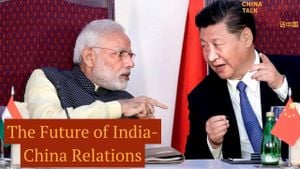Congress Triumphs in Palakkad Assembly By-election Sealing Historic Victory
On November 23, 2024, the Palakkad Assembly by-election unfolded with Congress candidate Rahul Mamkootathil claiming victory by over 18,840 votes, defeating BJP’s C. Krishnakumar. This win for Mamkootathil not only secures him a seat but also marks the highest margin ever recorded in the constituency history, eclipsing the previous record set by Shafi Parambil, who won the seat with 17,483 votes back in 2016.
The Palakkad by-election had generated significant political interest, especially considering the backdrop of party dynamics and local issues. Each of the three principal alliances—the Congress-led United Democratic Front (UDF), the Communist Party of India (Marxist)-backed Left Democratic Front (LDF), and the BJP’s National Democratic Alliance (NDA)—had thrown their weight behind candidates promising change and addressing pressing issues facing the constituency.
The atmosphere was electrified during the campaign which lasted nearly a month. Voter engagement reflected the high stakes involved, as turnout settled at 70.51%, somewhat lower than the 75.37% seen during the 2021 Kerala Assembly elections. This slight dip pointed to voter fatigue perhaps, but the race remained fiercely competitive, resembling the tight contests witnessed previously.
Rahul Mamkootathil, who is the Youth Congress president, ran his campaign on the foundation of local concerns including infrastructure development, agricultural policies, and economic growth, central to the Palakkad electorate. His candidacy, though slightly controversial due to his non-local origins, managed to resonate well with voters, leading the charge against rival candidates effectively.
C. Krishnakumar from BJP initially led the counts, capturing hearts with his local appeal, but as the counting progressed through 14 rounds, Mamkootathil not only narrowed the gap but surged to win and unwittingly quiet critics of his candidacy. Krishnakumar ended with 39,549 votes, making it clear the race wasn't nearly as simple as observers had speculated.
The third position was claimed by Dr. P. Sarin, who ran as an independent candidate but was staunchly backed by the LDF. Sarin, having made headlines for his defection from Congress just before the elections, was expected to capitalize on his former allies' voter base, yet he only attracted 37,293 votes. The predictions surrounding his campaign have proven to be overly optimistic as he finished underwhelmingly compared to expectations.
This assembly seat, known to be pro-Congress, had always presented challenges but the BJP was bolstered by the siting of strong local leaders and backed by renewed grassroots outreach initiatives. The local electorate, primarily made up of more than 70% Hindu voters, had tilted previously toward BJP trends, making this contest particularly pivotal. The outcome could redefine not just Palakkad's political horizon but also influence Kerala's upcoming elections.
These by-elections are less about immediate governance but more about testing the waters of party strategies heading toward the next set of elections. Congress, with this significant gain, signals its intent to maintain its foothold within Kerala, especially as it faces the backdrop of recent struggles across various regions, namely Haryana.
Political analysts view Mamkootathil’s victory not merely as personal success but as part of the larger narrative of Congress's attempts to reclaim its relevance amid fierce competition from regional parties. It casts doubts over the buoyancy of BJP's coalition politics within Kerala. Mamkootathil’s campaigns embraced local grievances—namely, infrastructure issues, agricultural distress, and rising living costs—that voters find pressing.
The electoral battle over Palakkad drew attention not only locally but regionally too, highlighting how tactical alliances, defectors, and strategic campaigning can impact voter sentiment. The election results here are also seen as reflective of the mood within electorates, compelling both main competitors to rethink roadmaps for their future campaigns.
Although Congress had its share of obstacles—like launching campaigns targeting specific demographics such as youth and women—the energy displayed seemed to invoke nostalgia of times when Congress was undisputedly dominant. With inter-party defections causing waves, the Palakkad by-election results remain pivotal, marking another milestone for Congress to rally around as they prepare for future contests across India.
The dynamics of Indian politics continue to shape shifts with every election, particularly under the scrutiny of national media and the gaze of public interests. The shifting loyalties and electoral tactics serve as constant reminders of how fluid political landscapes can be, particularly when local issues reign supreme amid the loud national narratives. Mamkootathil's decisive win, amid competition from both local and national contexts, paves the path forward for Congress as it seeks to rally strength and revitalize its presence moving toward the next mandate.
Through this by-election, the narratives of success, failure, and resilience continue to intertwine within the political fabric of Kerala, offering yet another chapter to the story of its diverse audience.



